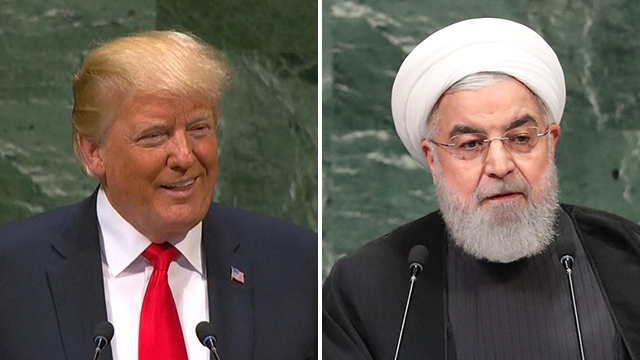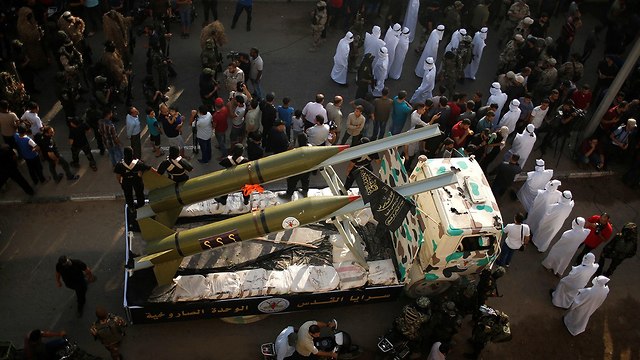
The attitude in Israel toward renewed sanctions on Iran is that of an open miracle. An extraordinary case in which history took a U-turn when it seemed that al was lost. The Iranians, for the first time in more than three years, are moving from a period of momentum — an international certificate of kashrut to the regime and regional expansion of an amazing scope — to the defensive.
From an optimistic perspective, the new sanctions will require the Iranians to engage in domestic matters, essentially the survival of the ayatollahs' regime, leaving less material and mental resources for the megalomaniacal moves of the kind we have seen in Syria, Yemen, Iraq and recently, even closer to home, on the Gaza front.
While Israelis are completely satisfied, officials in Washington, especially among those who pushed for an American exit from the nuclear agreement and to restore the sanctions, are less satisfied.
The special permit issued to eight countries to buy gas and oil from Iran, permitting the operation of three civilian reactors in Iran, and other issues, give the impression that the Europeans have obtained enough from President Trump to maintain the framework of the agreement. Moreover, some elements of the administration itself are trying to reconcile with the Iranians.
It may not seem realistic at the moment, but it is a Trump we are talking about, and it is difficult to assess the direction of his next move, especially since he declared that he is interested in a deal and called on the Iranians to return to the negotiating table.
It should also be noted that Trump maintains distance from the rhetoric regarding the overthrow of the Iranian regime. It reminds him of Bush-type complications in Iraq. Overall, he's a man of deals.
One way or another, this is an opportunity window that will not return. In the coming months, the Iranian regime will become poorer and more vulnerable. The resources it had to invest in Syria, for example, but also in the Palestinian arena, will diminish. In the absence of international enthusiasm to invest hundreds of billions in rehabilitating Syria, they will not reap any benefits from their huge investment in this country in the foreseeable future.
Israel must use this time wisely, especially by determinedly removing from them the desire to establish themselves in Syria, and perhaps also with a different approach toward the military wings of Hamas and Islamic Jihad, both funded by the Revolutionary Guards' al-Quds Force.
This is not the time to rest. We received a second, unbelievable opportunity, with the US withdrawal from the nuclear agreement, and we have to act on the assumption that there will be no third chance.
Not only the Iranians, but also the Palestinians, very much hope that they have only two years left with Trump, and not six years. As with the Iranian issue, here too, it should be ensured that Trump's activity, in this case the "deal of the century" that the Palestinians rejected even before it came to light, does not become destabilizing.
While Netanyahu juggles remarkably well between the Gulf states mired in their own conflict — the Saudis on a day and the Qataris at night — things close to home look much bleaker. Not only in Gaza, which could erupt again at any moment, but also in the West Bank.
After two years during which Mahmoud Abbas turned the phrase "the deal of the century" into a kind of curse, second only to the Balfour Declaration in terms of the scope of the historic catastrophe for the Palestinians, there is a chance that a public display of such a peace plan would lead to a large-scale Palestinian campaign against it, with whose consequences we will have to deal with.
There is no deadline yet to present the deal outline, but it is assumed that after the results of the US midterm elections are clear and nearing New Year’s, the administration’s excuses will run out.
“The deal of the century” was supposed to enjoy the full support of the Arab countries, especially Saudi Arabia. But the unexpected entanglement of the crown prince in the Khashoggi murder case casts doubt on his ability to engage in such an effort, especially against the will of the Palestinians, at a time when the international image of Saudi Arabia is at its lowest ebb since the September 11 attacks.
The Saudis were supposed to bring two things to the table: legitimization of the process and money. Money is still not lacking, but in a situation where Ben Salman is still trying to stabilize his chair, it is difficult to ask him to put his position to the test.
Trump's first two years were indulging for Israel. It is reasonable to assume that the administration's pro-Israel line will continue for the next two years, but it will also have to put up with the implications of its major moves from Tehran, through Syria, to Gaza and Jerusalem.



















